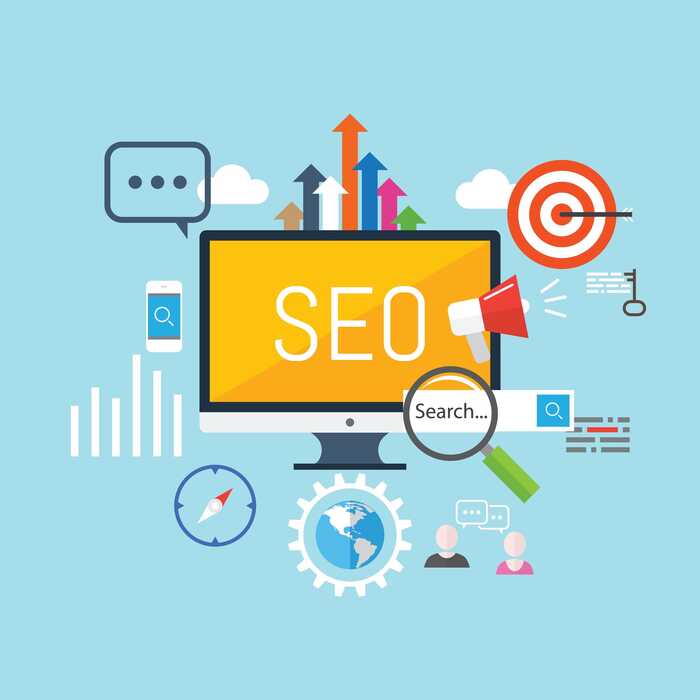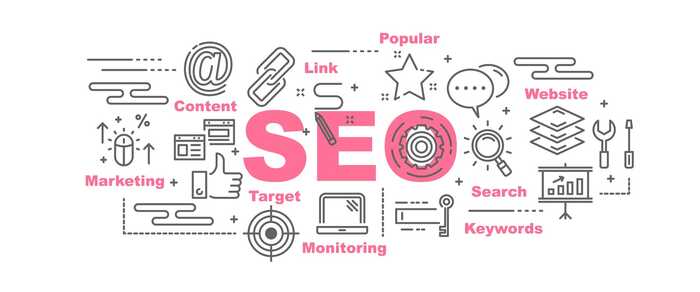What is SEO In Digital Marketing?
Our blog about PPC, SEO & CRO was so popular, we thought we should expand on the topics, so here's a guide to SEO, what is it and why you should care.

SEO (Search Engine Optimisation)
NounSEO is maximizing the number of visitors to your website by ensuring that it appears high on the list of results when someone searches for something relevant to you on a search engine like Google.

What are Organic Search Rankings?
Search results feature both paid and organic listings. The display of the two has changed over the years but paid results appear at the top and, at the moment, any paid result in the list will have 'Ad' in bold to the left of the title.
By organic results, we mean results which you don't have to pay for, that appear in the SERPS (Search Engine Results Pages) time and time again without a recurring cost.
If you target organic results you can ensure the long term success of your company, as once you have good rankings you appear in the results until other companies improve their website and overtake yours.
With paid listings, the moment you stop paying for every click someone makes on your advert you disappear entirely from that search result.
Which is Better? PPC (Pay Per Click) or SEO?
Both methods have their uses, SEO is an investment which is often cheaper in the long run, but you are unlikely to see immediate results. PPC, buying paid listings, is great for a short term boost in traffic or to reach terms which you don't want to feature on your site so can't rank organically for.
In most cases, there will be a good business case for a combination of both, which, if you have them managed by the same company, can work in harmony to target all your potential customers in a cost-effective way.
Why is SEO Vital for Small Businesses?
If you're looking for a pair of trainers, you might search your favourite brand too, or you're looking for tickets to a gig and you already know who you want to see - their name will be in your search term. When you search like that it's easy for Google to give you exactly what you're looking for.
If you are not a household name people are less likely to use your brand name in their search term, but there are people looking for services or products just like yours.
This is where small businesses can really benefit from utilising SEO, as new business prospects that come to you, instead of you having to use time and effort hunting them down, is a valuable resource. So appearing in the results for searches most relevant to your business is an efficient way to attract new customers who are primed to convert.
Things You Should Know About How To Do SEO
Content is King
There are many aspects to SEO, but the most important one is your content. The phrase content is king is thrown around a lot in the SEO world, here are three things to consider when you're creating content for your website.
Quantity
A website with little or no words isn't going to rank, Google reads your content and ranks you based on how relevant it thinks you are to the query that someone has searched.
If you don't think you can write 300 words or more on a subject, does it really need a page on your website? Or have you drilled down too deeply or added pages for the sake of pages? It's important to have a good quantity of content written about each topic or service area that you've chosen to include in your website.
Note: It's slightly different for product pages, which are often thin on content. It's very important here to include specifications and text - which do all still add to the word count - but can often fall shorter on the overall amount of text.
Quality
Although you want to have enough text, you don't want to have rubbish text. You need to write about, around and in-depth into your topic. Google looks for semantically similar keywords that you would expect to see based on the keyword you're trying to rank for.
For example, if you're writing a page about making bespoke wooden garden furniture, Google might expect to see words like oak, pine, paint, comfort, plants, flowers, trees, handmade, varnish, patio - you get the idea.
You need to write using a clear structure by using headings, drill into the topic with bullets and lists, add bold and italics to highlight keynotes and write in full paragraphs which are at the right level of difficulty for your target audience.
Keywords
The keywords that you choose to target should have the right balance of volume (number of searches) and competition (other people ranking) so that it's worth your time trying to reach page 1. You need to find the most relevant terms for each page that will attract the right kind of customer.
If you are selling high end beauty products the terms that you use will be different to those of a FMCG brand of lower priced beauty products, what would your customers search? Your keywords for each page should appear in the content, the headings and the technical areas of your SEO.
Not sure about this? There's more detail in this resource: 5 Ways to Improve Your Google Rankings, or we can help you out, ask us about our copywriting options.

Technical SEO
This is the really skilled bit of SEO, balancing the technical elements of the website for both robots and humans.
Although Googlebot does try to select the websites that a human would most value to appear at the top of results, it still has to go about this using an algorithm - which doesn't think like a human.
There are hundreds of technical elements to your website which can help or hinder your progress up the rankings. A couple of easy ones that you can fix yourself are:
- Meta Content - titles and descriptions for each page
- Alt Tags - descriptions attached to each image
- Sitemap- when creating new pages think carefully about where they should go, keep your site organised
If you'd like some help with your technical SEO then check out our SEO packages.
Core Web Vitals
As of May 2021 Google will be giving an organic ranking boost to websites which meet their Core Web Vitals benchmarks by adding CWV as part of the ranking algorithm. These benchmarks are categorised as a UX (user experience) ranking factor because they relate to the speed, responsiveness, and visual stability of a webpage. These are the details of the benchmarks that your site needs to meet:
Largest Contentful Paint
The loading time for the main content of your page needs to be 2.5 seconds or faster.
First Input Delay
Your page needs to become interactive in less than 100ms.
Cumulative Layout Shift
The amount of unexpected content movement on your page should be less than 0.1.
Off-Page SEO
Both of the above are often considered your on-page SEO, the elements that you are directly in control of as they appear on your website. There's another element, and that's other peoples websites.
Backlinks
We won't go into too much detail here as we have a resource specifically about Backlinks, but basically these are links to your page from another that you don't reciprocate. For this element you also want a higher quantity of links, but only high quality links from reputable websites.
Online Citations
Again we've gone into this in detail in another resource specifically about online citations, but quick summary, a citation is an online mention of your name, address and phone number (NAP) for your business - think Yell.com listings and directory websites and social media.
Unlinked Brand Mentions
Even if you can't get a website to link to your page, or they use a no follow link, a mention of your brand name on lots of other websites is still a 'vote' for your brand in the eyes of Google.
Google My Business
This wonderful tool from Google and it's benefits for your SEO are covered in this GMB blog.

How Will I Know If It's Working?
One of the best things for a small business is that SEO is entirely measurable. Installing Google Analytics on your website is easy, simply open an account and copy the code into the Main Settings in your CMS. If your site is new or you have a retainer with us then we'll have already set this up.
Google Analytics is free software which tracks the traffic to your website, where it came from and what they did once they were there. The better your SEO is working, the more quality traffic will be visiting your website. That's not the only benefit - check out 5 Reasons to Use Google Analytics.
Lets Get Optimising
So SEO is really important if you want more customers in the digital world we now live in. There are lots of simple things you can do, as described above, which will help. If you'd like a more comprehensive blog about all the different elements of SEO and how they contribute to your rankings we recomment the Moz Beginners Guide to SEO.
Even if you don't choose to do your SEO yourself, it's important to have a basic understanding so you know what exactly you're buying and don't end up flinging money into a blackhole. We send an email series to our SEO clients so they are in the loop about what we're up to on their website.
We offer SEO services which include a video run down of what we've been up to and what progress we've made, so you're always in the loop and we're accountable for the money that you're spending each month. We find this is especially valuable for smaller businesses who are putting a big chunk of their marketing budget into such a long term plan and want to help by working with us to achieve more.
If you'd like some help with your SEO then check out our SEO packages and feel free to get in touch.
Other Relevant Resources
There's always more to learn, we recommend these blogs:
Posted on February 8th 2021




